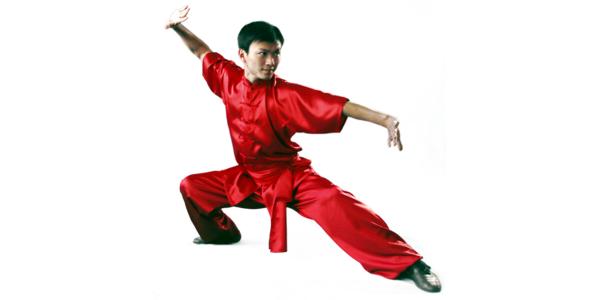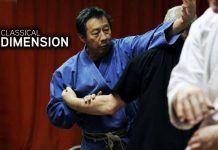As a composite organism in wushu training, internal and external work helps to make a martial artist strong outwardly and sturdy inwardly.
DOWN through the ages, martial artists in China lay stress on a combination of “internal” and “external” work, mental training in particular. They hold that the training, nourishment and concentration of qi (vital energy) as well as the application of qi in combat are of great importance to martial devotees.
There are various methods of directing qi to a certain part of body in wushu training. Among other things, “the training of qi as internal work and strengthening of muscles, bones, and skin as external one,” “the flow of qi down to the dantian (elixir field)” and “summoning strength through the direction of qi” are basic skills to be mastered by wushu practitioners and command great attention in all schools of martial arts. Of eight training methods in changquan (long- range boxing), for example, jing (essence of life), shen (spirit), qi (vital energy), li (power) and gong (skill) refers to the training of mind, awareness, respiration and innate strength, the application of qi included, while external work involves the use of the hands, the eyes, the trunk and the feet. Another instance is nanquan (southern-style boxing) which emphasizes the training of the mind, spirit, qi and willpower in “internal work” and the exercise of the hands, the eyes, the trunk, the waist and the feet in “external work.” Those energy-consuming movements should be completed in coordination with exhalation and utterance. Shaolin martial artists also pay attention to the training of qi and a man who has just started wushu practice should do standing exercises before he goes ahead with other exercises. A book on Shaolin wushu has this to say about the relationship between standing exercises and the training of qi, “In comparison with other standing exercises such as standing on the ground or on stakes, horse-riding stance is the most important. When you do it well, you can direct your qi down to the dantian and become as firm as a rock.” It adds, “Qi appears in the lungs and controls strength during respiration. When you fail to concentrate on training for some time, your gi will get stagnated and flatulence will develop.”
Other barehanded exercises also pay ample attention to the training. of qi. Taijiquan, for one, requires that a practitioner should move his body with will and in coordination with breath. Will can be used to adjust your breath and direct your qi. And the methods include mental concentration, following your breaths, hearing your breaths and sinking qi into the dantian. The training of qi in taijiquan is similar to that in qigong (breathing exercise) and conducted by means of opening, closing, ascending and descending. If you are a regular taijiquan practitioner, you must be familiar with such proverbs as “the circulation of qi with will,” “the inducement of qi with the mind” and “the flow of qi down to the dantian.” Such is also the case with xingyiquan (form and will boxing). When you practice it, you should try to attain a perfect combination of mind and will, will and qi and qi and strength.
As a composite organism in wushu training, internal and external work helps to make a martial artist strong outwardly and sturdy inwardly. This may be proved by many well-known wushu masters who never fail to pay attention to the training of qi while improving their physical skills.
By Li Chengyin
From Martial Arts of China Vol. 1, No. 7 , Page 319
(Translated by Song Ning and CuiYangping)










